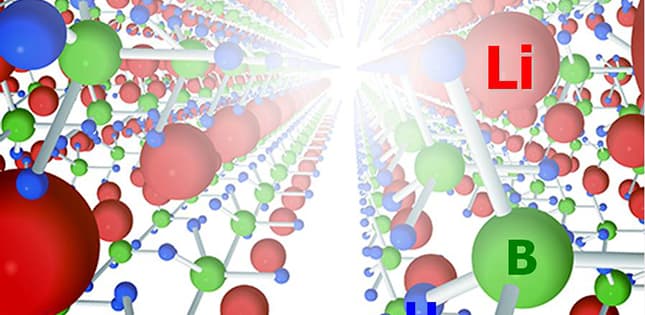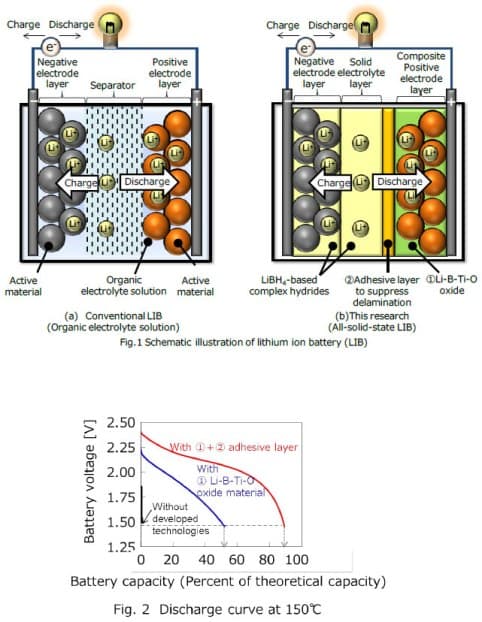Next-Gen Thermally Durable Li-Ion Battery Soon To Be A Reality
Hitachi ltd. and Tohoku University’s Advanced Institute for Material Research (AIMR) group have developed a basic technology to reduce the internal resistance of all-solid-state lithium-ion battery using a complex hydride as a solid electrolyte under the project titled ‘Collaborative Research for Next Generation Innovative Battery’.
With the reduction of internal resistance, the charge-discharge performance of the battery improves and can well operate at temperatures as high as 150º Celsius. The battery does not require cooling system as seen in the conventional ones, which results in reduction of overall costs. This hints at the technology's wide variety of applications from large scale industrial machines with motors to medical instruments which require to be heated for Autoclave sterilisation.

The conventional high energy density Li-ion battery is already being used as a power source in smart phones, tablets, electric vehicles etc. It consists of an organic electrolyte solution, a separator, a positive electrode layer and a negative electrode layer. The organic electrolyte solution is the one filled in between the electrodes where lithium ions conduct between the two layers during charge and discharge process.
However, the concern with organic electrolyte solution is its thermal durability. Due to volatility of the solution at high temperature ranges (above 60ºC), it’s difficult to use them at varied high temperature scenarios without cooling systems. Therefore, the team has used a novel material - a LiBH4 based complex hydride as a solid electrolyte.

For commercialization of this system the lithium ion conductivity of solid electrolyte needs to be improved which isn't at par with the organic solutions used today. The internal resistance of the battery also needs to be lessened by enhancing the energy density and charge-discharge duration.
The battery was found to have a discharge capacity of 90% of theoretical value from a prototype of Li-ion battery with the capacity of 2 mAh and the energy density of 30 Wh/L during the researchers' experiments.
With this recent advancement, conventional Li-ion battery systems are sure set to be revolutionized, finding applications in even more varied arenas with durability of cost and improved performance in the offering.
Source: #-Link-Snipped-#
With the reduction of internal resistance, the charge-discharge performance of the battery improves and can well operate at temperatures as high as 150º Celsius. The battery does not require cooling system as seen in the conventional ones, which results in reduction of overall costs. This hints at the technology's wide variety of applications from large scale industrial machines with motors to medical instruments which require to be heated for Autoclave sterilisation.

The conventional high energy density Li-ion battery is already being used as a power source in smart phones, tablets, electric vehicles etc. It consists of an organic electrolyte solution, a separator, a positive electrode layer and a negative electrode layer. The organic electrolyte solution is the one filled in between the electrodes where lithium ions conduct between the two layers during charge and discharge process.
However, the concern with organic electrolyte solution is its thermal durability. Due to volatility of the solution at high temperature ranges (above 60ºC), it’s difficult to use them at varied high temperature scenarios without cooling systems. Therefore, the team has used a novel material - a LiBH4 based complex hydride as a solid electrolyte.

For commercialization of this system the lithium ion conductivity of solid electrolyte needs to be improved which isn't at par with the organic solutions used today. The internal resistance of the battery also needs to be lessened by enhancing the energy density and charge-discharge duration.
The battery was found to have a discharge capacity of 90% of theoretical value from a prototype of Li-ion battery with the capacity of 2 mAh and the energy density of 30 Wh/L during the researchers' experiments.
With this recent advancement, conventional Li-ion battery systems are sure set to be revolutionized, finding applications in even more varied arenas with durability of cost and improved performance in the offering.
Source: #-Link-Snipped-#
0

